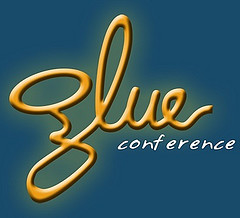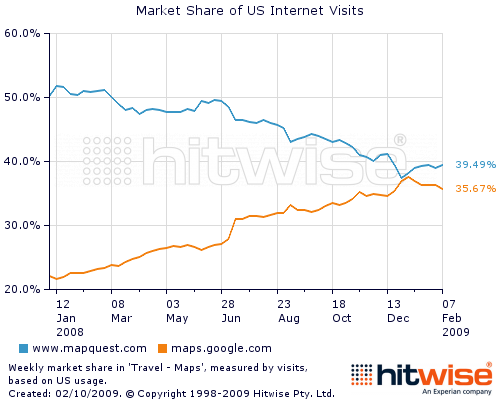-
 What is Glue?
What is Glue? - Definition from the Merriam-Webster Dictionary:
- 1 a: any of various strong adhesive substances ; especially : a hard protein chiefly gelatinous substance that absorbs water to form a viscous solution with strong adhesive properties and that is obtained by cooking down collagenous materials (as hides or bones) b: a solution of glue used for sticking things together
- Hm – not what I am looking for, if you need it, you can buy it here – end of story.
- 2 something that binds together <enough social glue…to satisfy the human desire for community — E. D. Hirsch, Jr.>
-
Social Glue … now we’re getting closer. So again, what is Glue? There are several companies in the software business with
goo-yglue-y products:Glue is Companies and Products
AdaptiveBlue has a browser extension called Glue. (Blue Glue?
 ) VC and Blogger Fred Wilson aptly calls it A Social Net That Lives In Your Browser.
) VC and Blogger Fred Wilson aptly calls it A Social Net That Lives In Your Browser. Then there is Yahoo Glue. And of course there are a bunch of companies that don’t call themselves or their products Glue – they just do it.
Gnip’s mission is elegantly “Making data portability suck less”. Here’s an easy (?) chart explaining what they do:

Boomi is another Glue company, providing integration Platform-as-a-Service (iPaaS – ah, starting 5-letter acronyms
 ). Read their thought-provoking post on Why APIs Don’t Solve the SaaS Integration Challenge.
). Read their thought-provoking post on Why APIs Don’t Solve the SaaS Integration Challenge. MindTouch started their life as a wiki company, and grew into “an open source enterprise collaboration and community platform that enables users to connect and remix enterprise systems, social tools and web services.”. Ouch, that sounds so official – here’s another version from the Chief Conductor who just returned from a major Product Launch:
We do orchestration for a myriad of systems, databases and any web service, all with a easy to use wiki-like interface.
Let’s not forget about Mashery, plumbers of the Web, or more elegantly, a “leading provider of API management services enabling companies to easily leverage web services as a distribution channel.”
The list can go on and on, and even in the current downturn we will see more Glue companies. In fact Glue has become investment theme for some really smart VCs:
Glue is our term for the web infrastructure layer that facilitates the connections between web services and content companies
Glue is a Concept – actually, several concepts
- Enterprise Glue: A "web oriented architecture" and beyond SOA
- Data Glue: Mash-ups, mash-ups and more mash-ups
- Social Network Glue: The movement toward cross-network interoperability and data sharing
- Interface Glue: Cross-platform, cross-browser technologies like Silverlight and Adobe Air
- Messaging Glue: Tools that are evolving for meta-messaging
- Identity Glue: Reputation, user-centric identity and web sso
- OS Glue: Cross-operating system runtimes
- Marketing Glue: The abstraction of the management of ad platforms into a common interface
- Infrastructure Glue: Cloud and Utility computing that binds back-end services
Oh, boy. This is big, way over my head. I better leave this discussion to smarter people who actually understand the technology behind all this.
 But I’ll share a secret: they will all come together in Denver, on May 12-13 of this year. Will you be there?
But I’ll share a secret: they will all come together in Denver, on May 12-13 of this year. Will you be there?Glue is a Great Conference – Get Sticky Now
 I’ve discussed earlier how Defrag was the best Conference I attended for quite a while. The conference Theme, sessions, very active participants, the venue, the infrastructure (working wi-fi, no small feat!) – you name it, it all came together perfectly. So when Defrag’s organizer, Eric Norlin sets out to launch another conference discussing all of the above and more, it’s bound to be a success. Here’s Eric’s summary:
I’ve discussed earlier how Defrag was the best Conference I attended for quite a while. The conference Theme, sessions, very active participants, the venue, the infrastructure (working wi-fi, no small feat!) – you name it, it all came together perfectly. So when Defrag’s organizer, Eric Norlin sets out to launch another conference discussing all of the above and more, it’s bound to be a success. Here’s Eric’s summary:Glue is the only conference devoted solely to solving the web application integration problem-set. People that should attend Glue include the architects, developers, administrators and integrators that have moved past the initial step of seeing the web as a platform, and are facing the real-world challenges of what "stove-piped" web applications mean for their overall strategy. Glue is about all of bits and pieces, APIs and meta-data, standards and connectors that will help us to glue together the varying applications of the new platform.
The Agenda is shaping up, Sponsors are in, and reservations are coming through nicely, recession or not. Like I’ve said, Some Conferences Are Worth Attending Even in Bad Times.

Of course getting a bargain helps in bad times: where else do you get an intense top-notch conference for $395? That is if you catch early bird reservation, so hurry, get sticky now.
By the way, participation does not start in May – you can share ideas right now, I’ll help with resources. CloudAve, my main blogging gig is pleased to be the Media Sponsor for Glue, and you will see a stream of related posts over there as we approach the Conference dates (this may be the right time to grab the CloudAve Feed). We invite everyone interested to participate: please submit your post, we’ll be happy to publish it. And if you prefer to post in your own blog, wiki, Twitter, FriendFeed, Facebook…whatever – just make sure to use the tag gluecon (since glue might find – you know, this). We’ll find your post and pull it under the Glue Tab, which will soon turn into a resource list of all-things-glue.
On a personal level I am stoked to be able to serve on the Glue Conference‘s Advisory Board along with great thinkers like Amy Wohl, Phil Wainewright, Chris Shipley, Mike West, and Albert Wenger. I’m really excited about this Conference, and am looking forward to meeting many of you.
What are you waiting for? Get Sticky Now!

(Cross-posted from CloudAve)

FED-Watching
Stocks up as Bernanke says recession to end in ’09 (AP)
– 28 minutes agoBernanke fears recession could extend to 2010
– 30 minutes ago
Now, which one is it?

Resistance is Futile: We Will Be Assimilated – by Google.
Two seemingly unrelated items:
Today Hitwise reported on how Google Maps is catching up on Mapquest, which once was the king of online mapping.

Perhaps more important than just the numbers is the source of traffic: 61% of Google Maps traffic comes from links placed in organic Google Search results. Contrast that to Mapquest, where 8 out of 10 hits come from searches on the Mapquest brand itself. Translation: Mapquest is only used by its already dwindling user base, while Google Maps gains steadily, since Google owns Search. The writing is clearly on the wall.
The second story: Google Gmail Within Striking Distance Of Hotmail – reported Information Week a few days ago. Wait, wasn’t Gmail supposed to be email for the geeks only, lagging behind the masses of Yahoo and Hotmail users?
Between September 2007 and September 2008, Gmail’s visitor total grew 39%, from 18.8 million to 26 million, ComScore figures indicate. Windows Live Hotmail during this period saw its visitor share decline 4%, from 46.2 million to 44.6 million.
If Google’s Gmail growth rate rises to, say, 46% over 2009, it could reach approximately 43 million unique U.S. visitors by the end of the year. And if Windows Live Hotmail continues to bleed visitors at a rate of, say, 3%, it will finish the year with around 42 million unique visitors per month.
So Gmail may overtake Hotmail by the end of this year, and if the trend continues, it might overtake Yahoo by the end of 2011, concludes Information Week. Note, these are site visits, not account numbers, but account numbers include all the throw-away, long forgotten dormant accounts that both Yahoo and Hotmail has in abundance. All these email systems being web-based, visitor stats are a better representation of actual usage.
The third story (yes, I promised two, but can’t stop now): The Google Power Meter., currently being tested by Google employees. These are smart devices you plug in all around the house, they will report back to the mothership and you get a nice dashboard aimed at helping you making the right energy choices.

I would certainly like to know just how “smart” they can be – any chance of bi-directional communication? I can’t help but remember the mail campaign from PG&E, my utility company. They are handing out $25 to anyone who allows them to install a smart thermostat free of charge. The catch? At times when consumption reaches peak levels, the utility company can remotely throttle back your air conditioner. So now you see why I’m hesitant about these Google electricity meters. Could they be switched from passive reporting to regulating one day?
The fourth story (gee, I really have to stop soon): An opinion piece on Bloomberg discusses how the health provisions slipped into the stimulus bill will effect every one of us in the US:
Your medical treatments will be tracked electronically by a federal system. Having electronic medical records at your fingertips, easily transferred to a hospital, is beneficial. It will help avoid duplicate tests and errors. But the bill goes further. One new bureaucracy, the National Coordinator of Health Information Technology, will monitor treatments to make sure your doctor is doing what the federal government deems appropriate and cost effective. The goal is to reduce costs and “guide” your doctor’s decisions (442, 446).
Ouch. I’m all for electronic medical records, but I don’t want them to be turned into a Big Brother function. And I don’t want a computer program to decide on my medical treatment. But I’ve just complained about the Sorry State of Health 2.0: neither Google Health nor Microsoft HealthVault are up to the job yet. I want them to get there, and I trust they will (at least one of them). I don’t want them to run my health care, just help me and my providers manage it – but fear of potential misuse won’t stop my desire for progrees.
Do you see the trend here? Google is unstoppable. They want to manage all data, but our life is increasingly all about data and what we do with it. The former Borg in Redmond is now a toothless veteran, slowly dwindling away – Google is the New Borg. Resistance is futile. We’re being assimilated. And we like it. Enjoy the video: (better quality if you click through)
Related posts:
(This post originally appeared @ CloudAve. To stay abreast of Clod Computing, SaaS news and analysis, grab the CloudAve feed here.)

*Chirpy, Chirpy – New Twitter Client DOA.
*chirp (won’t that asterisk in the front backfire with some search engines?) is supposedly the best, cutest, Twhirl-killer mother-of-all Twitter Client. Except it’s Dead On Arrival. Read the full story here…
..and in the meantime a little consolation prize:

Spirit (-less) Airlines Charges Flight 1549 Survivors Cancellation Fee
Ouch, this airline badly needs Customer Service training.
Spirit Airlines is trying to charge passengers extra fees after canceling a flight, which forced the passengers to be on the plane that landed in the river Thursday.
Rob and Jeff Kolodjay were scheduled to fly on Spirit Airlines to a golf vacation with four other friends on Thursday out of LaGuardia in New York City. Their flight got cancelled, and they were rebooked on to US Airways flight 1549.
While the Kolodjay’s have good things to say about US Airways, they are less pleased about the policies of their original carrier. When they tried to cancel the return tickets on Spirit they could not use because they never made it to Myrtle Beach, the company representative insisted on charging them a cancellation fee.
Source: Fox61, Consumerist, and soon all media outlets. I doubt Spirit has even a clue about the magnitude of the PR Nighmare they are getting into…
Update: The story is making the rounds. Her’s an interesting reaction:
You know, in some cultures the response to this would be to lock the customer service representative in a room with a gun and expect him to do the honorable thing. I’m not saying that this is the right solution – but it’s probably the one that Spirit Airlines might end up wishing that it could pursue…

(Photo Credit: CrunchGear)
Update: Somebody who thinks woke up @ Spirit, reversing the earlier decision:
Spirit Airlines has given the Kolodjay family a full refund and have issued credits to their credit cards. They will not be charged anything by Spirit Airlines.. We applaud everyone involved in bringing these passengers to safety wish the family the best.

Startups, Remember: Transparency, Transparency, Transparency
- How can people even think of launching a service without revealing the price upfront?
- How can they expect users to go through the hassle of signing up, installing software, only to find the price info after all this?
- Why do people still fall for this?
I’m discussing the above and more using Zumodrive’s launch as case study over @ CloudAve – read the details here.


The Tale of Two Notebooks, and Yes, It’s All About Earning a Buck
One down, one running better than ever. Thanks to the irony of TechMeme, the two news are juxtaposed almost side by side:
Stopping development on Google Notebook – as several blogs point out, this does not mean Google Notebook is dead. You can continue to use it as your scratch-pad, just don’t expect any further development. (Update: you won’t be able to use the web-clipping Firefox extension anymore.) Or if you’re cautious, start migrating your notes.
- Multiple Enhancements in Zoho Notebook – yes, ironically Zoho announced a bunch
 of enhancement on the very same day Google sent theirs to the deadpool. Kent Newsome calls it Zoho’s Lucky Day.
of enhancement on the very same day Google sent theirs to the deadpool. Kent Newsome calls it Zoho’s Lucky Day.
I’ve never considered these two Notebooks comparable, despite the common name. Google’s one was your web-based post-it notes, barebones, easy to use. Zoho’s version is a full-featured multimedia application to create, aggregate, share, collaborate on just about any type of content easily, be it text, database, spreadsheet, image, drawings, audio, video – you name it. It offers a lot more, but may be “too much” if all you want is the yellow stickies. The two apps serve entirely different needs. But I don’t want to focus on the products here, did it before: Not All Notebooks Are Created Equal.
Let’s talk about the economics: Google is simply ditching some of the money losers which is clearly the right strategy in a recession when it saw it’s primary revenue source, advertising drop radically. A while ago (before the economy collapsed) Zoho CEO Sridhar Vembu provided great insight into why getting into applications does not make much financial sense for Google, whereas it is Zoho’s primary business. Today we’re seeing that logic in action.
Of course Google is not the only one, we’re seeing startups shut down service, or give up the free-for-all principle and start charging for their services. Over at CloudAve we’ve discussed Jott as an example, but there are many others. We may have enjoyed all these free services, but deep down had to predict this bonanza would not last forever. It’s time for rationalizing business – after all, it’s all about making a buck.
Update (1/20/09): Surprise, surprise! (not really). Zoho came out with a tool to import your Google Notebook data into Zoho Notebook.
Update (1/22/09) Two days later here comes Evernote with an import process. Who’s next?
Related articles by Zemanta
- Don’t despair, Google Notebook users: Import to Zoho
- Transfer Your Google Notebook to Zoho – Quickly & Effortlessly
- Google Notebook – Help Is On The Way
- Zoho Seeks To Capitalize On Closure Of Google Notebook With Easy Import
- Zoho, Evernote, reach out to disenfranchised Google Notebookers
- Four places that import your Google Notebooks


Credit Crunch? Borrow from Those Who Can’t Refuse
That’s the solution the State of California is contemplating: borrow from taxpayers – not that they have a say in the matter:

“California, the most populous state in the nation, is running out of cash with a $41.6 billion deficit that Gov. Arnold Schwarzenegger and lawmakers have thus far been unable to resolve despite more than two months of negotiations.
The situation is so dire that the state controller has warned he will have to delay payments to taxpayers, businesses, social service programs and student aid to conserve money in the state’s checking account. Finance officials project the state will run out of cash in late February, but the state controller will have make a decision by Feb. 1.”
Source: SF Chronicle

Crunchies 2008: Whatever Happened to Startups?
There were two Golden Globes ceremonies this weekend: one for movies, and one for Technology. The latter, the Crunchies took place in San Francisco
At the first Crunchies I asked: whatever happened to business software?
This year the question is: whatever happened to startups?




Recent Comments